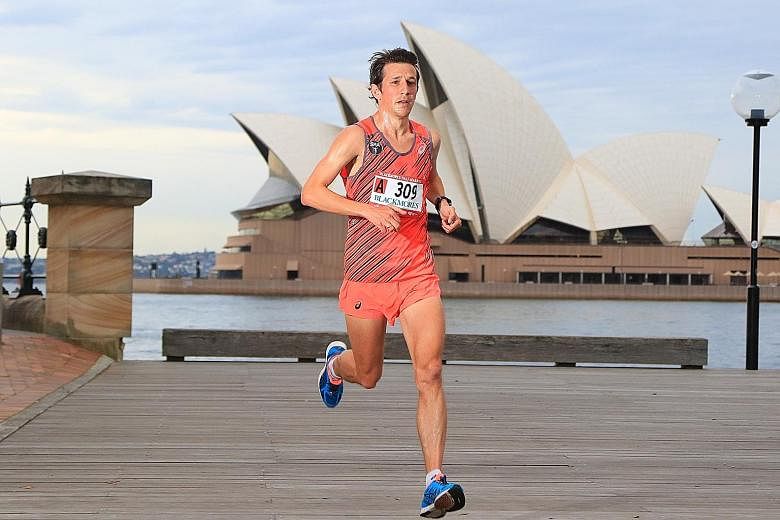Racing abroad is both inevitable, and invaluable, for an elite runner - you aspire to compete in international championships and, once there, let your best performance shine through and take centre stage.
For serious recreational runners, taking part in these races will (hopefully) present the right conditions, at the right point of a training cycle, and the right company of runners looking to achieve a similar goal.
Whatever your level of athleticism, you can learn a lot from racing in other countries and the knowledge gained will make you a better athlete by enhancing your race-day experience and confidence.
While penning this article, I decided to "interview" my fellow ONEathlete(s) and three of Singapore's fastest marathoners, to understand their perspectives (from a local viewpoint) on overseas races.
Throughout my running career, I've also been extremely fortunate to have raced in over 20 countries across almost every continent.
These experiences and perspectives have helped shape and frame my thoughts below.
STRENGTHENS MENTAL CAPABILITIES
First and foremost, you will gain huge psychological flexibility and resilience in terms of race preparation. Different countries have different approaches towards race organisation, which then affect how athletes prepare themselves leading up to race day.
Indeed, things will be different to what you are used to in a local race, especially in the final 24 to 48 hours before the start. Even seemingly innocuous details can throw you off your game - the race start time, how you get to the start and even the drinks out on the course. What I came to realise was also how I was overly concerned with every single detail of my pre-race routine and there were just a few things that I had to focus on to get it right.

National marathoner Ashley Liew, who has just completed his fifth Gold Coast Marathon, agrees that "overseas runs take you out of your comfort zone and force you to adapt to different climates and environments. This challenge is essential as part of any runner's development and is what you should be striving for besides lowering your personal best". Going through this "rite of passage" also gives you the confidence to get the best out of yourself even when conditions change - hugely valuable in any race when events don't pan out the way you expect, as they inevitably will.
IMPROVES RACE TACTICS
After two decades of racing overseas, I also learnt that my "racing brain" and performance have improved. Learning to deal with the different racing conditions and race tactics can help make you a better, and more versatile, runner. Be it the Japanese races that have only 500 runners who go out at breakneck pace, Sydney's City to Surf with the incredible crowd atmosphere, or the physical challenge of the deep mud in an English cross-country race, what these races offer are opportunities for you to discover and learn about yourself as an athlete - knowledge that will be very helpful for you in future races.
I find that while runners train regularly and frequently, they often race less than they should, and that is why many often begrudge not getting the best out of themselves.
Having finished third at the Standard Chartered Singapore Marathon 2017 and, as the top Asian at the Bangkok Midnight Marathon 2017, Evan Chee looked back at his overseas races, and felt that the depth of race experience, along with the opportunity to run with world-class professional athletes, sharpened his technical ability to race tactically, and broadened his understanding of what his body is capable of.
"I got carried away and went out too hard" or "I didn't know how the hills would affect me" are common post-race complaints. Races abroad can throw up curveball situations that can, and will, help you discover yourself and your limits. Eventually this knowledge will go a long way in guiding you to avoid beginner mistakes and make better decisions in future races.
OFFERS UNIQUE EXPERIENCES
As far as possible, you should also ensure the race fits into your training schedule - it could be the pinnacle of a training programme, or perhaps a stepping stone to something bigger. Whichever the case, make sure the distance and race conditions fit into your training needs and experiences you seek.
Two-time SEA Games gold medallist and winner of the Christchurch Marathon 2011, Mok Ying Ren, had this to add: "It is important to be well informed about race details, such as being familiar with race route, terrain and conditions, so as to maximise overseas race experience. You wouldn't want to be forced to drop out of the race due to poor preparation, and waste your efforts, as well as race and travel fees."
Depending on your race objectives, he recommends a fast and flat course (such as the Gold Coast Marathon) if your aim is to lower your personal best, or to choose one of the six World Marathon Majors if the allure of its exclusivity appeals to you. For young families looking for a fun and run combination, look for events such as the Walt Disney World Marathon.
Pick a race in a country that you've always wanted to visit, and use the opportunity to immerse yourself in a new culture, experience the countryside, or meet new people.
SHARPENS FORESIGHT AND PLANNING
Knowing that you can gain a lot from the experience, the next logical question is how you can prepare for a race abroad if you haven't done many (or any).
For starters, I would suggest you modify your training and preparation to mimic race-day conditions as far as possible. Otherwise, try switching your usual training routine by adding in new elements - different routes, run at different times of the day, or start faster than normal.
This will afford you the confidence to perform even when conditions are out-of-the-norm for you. That said, I will advise runners who are preparing for an overseas race to stick to snacks and drinks that they are used to - the last thing anyone wants is a last-minute dietary issue before a much-awaited overseas race.
While it's not always possible to personally check out the course before race day, you can search for this information on blogs and forums. Make the most of lessons gleaned from others' mistakes to avoid having to go through the learning pains yourself. I always try and "recce" the hardest parts of the course, the likely weather conditions, how well organised the race is, as well as any tips for race kit.
PRESENTS MEMORABLE OPPORTUNITY TO RELAX
As a parting note, I would strongly encourage you to just go out there and enjoy the experience.
I have so many fond memories of races abroad that I wouldn't trade for anything - running through mills in Milan, around golf courses in Algeria, or up and down hills in Hong Kong. When you run anywhere for the first time, it is normal to feel the nerves, but try and remember that feeling so it will be a memorable experience.
Also ensure that you recover well afterwards. Often the nerves and stresses of travelling can be more draining than you realise and it's very common to feel lethargic or even under the weather for up to a week after an overseas "race-cation" - ease back into training slowly. If you can work this recovery into a few days to slowly enjoy your overseas travel by being a tourist, all the better.
• Ben Moreau is a Commonwealth Games athlete from England, and has raced in more than 20 countries. His marathon personal best is 2:15:52 (2013 Fukuoka, Japan), and he is managed by ONEathlete. He is currently the innovation director of an MNC based in Singapore.


